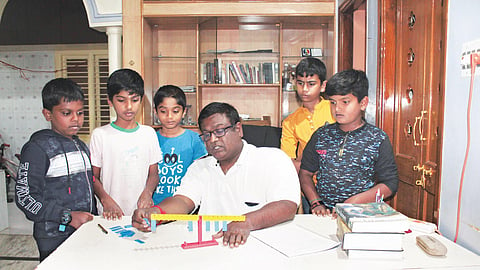

"The only way to learn mathematics is to do mathematics," said the mathematician Paul Halmos. Mahesha M of Prajna Mathematics at Hebbal in Bengaluru lets his students do this, but with his out-of-the-box methodologies.
Whether it is the touch-and-feel method for teaching geometry or origami to drive home the concepts of algebra or even ancient folklore to make students get a grip on numbers, Mahesha is always on the look-out for innovative teaching methods.
"I have come across books published way back in 1882 that explain the basics of algebra and its application in real life in a wonderful way. The methods I use today is the result of years of research, experimentation and developing my own materials based on these learnings," adds the 46-year-old.
In fact, Mahesha has a sack full of tamarind seeds at his centre (marbles are hardly available these days, he says) for younger children to count in order to develop a knack for numbers. "I just ask them to pick out, say, 200 seeds in a given time; it is up to them to find out the fastest method," quips Mahesha, who also studies how mathematical concepts are taught in schools across Europe and America.
He has bought several such materials which he either modifies or improvises on to suit the needs of his students. This is particularly useful while teaching concepts like fractions, Mahesha says. From mathematical games like the Rubik's cube to models like the tower of Hanoi and techniques like mental and Vedic maths, Mahesha uses a combination of multiple tools to make maths fun for children.
As a result, he says, his students are easily able to recite tables up to 100 using simple methods like splitting and distributive property. "I developed a love for the subject with Mahesha Sir when I was struggling in school. With his coaching, I completed my MSc in maths and became a maths lecturer. Now I plan to enrol for a PhD in the subject," says his student Shalini, who now lives in Germany.
Being physically challenged since he was an infant, Mahesha spent his formative years confined indoors. Playing with marbles and counting them in groups of 2,5,10 etc. made him develop a liking for numbers. But it was not until high school that he developed a true love for maths.
Mahesha went on to finish his engineering in computer science and worked for over 15 years in the corporate sector. Teaching, however, remained his first love. "Teaching is something that I truly enjoy. I want students to be aware, think and ask questions," says Mahesha who has been a full-time teacher since 2017.
With two batches a day, close to 60 students from Class III to X and four other teachers, Mahesha has his hands full. The morning batch of 30 high school students from Hebbal Government School are coached free of cost.
Crippled at the age of two by polio, Mahesha faced issues of mobility and poverty. Therefore, he helps many people struggling with these issues too. "Mahesha's story is one that needs to be told and his contribution in the academic success of several students, including my son, is invaluable," says Anitha, a teacher with an international school, and whose son Parikshit is a student of Prajna.